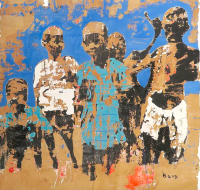 The questions raised by Ana Bigotte, on the contrary, are not formulated in the strict disciplinary framework of art history, but from the porous and open framework of theory and cultural studies, taking as fundamental references the work of authors such as Luís Trindade or Boaventura de Sousa Santos, whose object goes beyond the specific sphere of the artistic to approach culture as a social process with multiple branches. It does so by following the path opened by André Lepecki, who formulated interesting hypotheses about the construction of the Portuguese social "body" from the study of dance and performance. This is another distinctive specificity of the Portuguese case that contrasts with that of the neighboring country: the focus on the arts of the body and the so-called "living arts", such as theater, dance, and music.
The questions raised by Ana Bigotte, on the contrary, are not formulated in the strict disciplinary framework of art history, but from the porous and open framework of theory and cultural studies, taking as fundamental references the work of authors such as Luís Trindade or Boaventura de Sousa Santos, whose object goes beyond the specific sphere of the artistic to approach culture as a social process with multiple branches. It does so by following the path opened by André Lepecki, who formulated interesting hypotheses about the construction of the Portuguese social "body" from the study of dance and performance. This is another distinctive specificity of the Portuguese case that contrasts with that of the neighboring country: the focus on the arts of the body and the so-called "living arts", such as theater, dance, and music.
Stages
06.03.2023 | by Jesús Carrillo
 At its heart, MIXED is an exploration of racial and cultural identity. MIXED deals specifically with people that have mixed heritage, delving into the experiences of each subject that also echo his own. The series addresses the existential feeling of not fully belonging, while examining the cost of assimilation within society. The conversations focus especially on the contradiction of fitting in everywhere but nowhere at the same time and the resulting shoot is a collaboration that encompasses the themes considered.
At its heart, MIXED is an exploration of racial and cultural identity. MIXED deals specifically with people that have mixed heritage, delving into the experiences of each subject that also echo his own. The series addresses the existential feeling of not fully belonging, while examining the cost of assimilation within society. The conversations focus especially on the contradiction of fitting in everywhere but nowhere at the same time and the resulting shoot is a collaboration that encompasses the themes considered.
Stages
02.11.2022 | by Theo Gould
 In the contemporary discussions regarding post-colonial Europe, the concepts of memory and post- memory have taken on growing importance, giving prominence to an insight with great political relevance: colonialism never ends with those who enforced or suffered it. Traces of a colonial mindset impregnate generations to come and it has been passed down through the image of the former coloniser and the former colonised. These characters restage a complex phantasmagoria closely related to the most intimate ghost of the European subconscious: its colonial ghost which manifests itself inter alia in the form of a colonial “transfer of memory” – as racism, segregation, exclusion, subalternity – or in the form of “eruptions of memory”, and thereby questions the very essence of European multicultural societies, shaped by colonial heritage and fed by waves of migration.
In the contemporary discussions regarding post-colonial Europe, the concepts of memory and post- memory have taken on growing importance, giving prominence to an insight with great political relevance: colonialism never ends with those who enforced or suffered it. Traces of a colonial mindset impregnate generations to come and it has been passed down through the image of the former coloniser and the former colonised. These characters restage a complex phantasmagoria closely related to the most intimate ghost of the European subconscious: its colonial ghost which manifests itself inter alia in the form of a colonial “transfer of memory” – as racism, segregation, exclusion, subalternity – or in the form of “eruptions of memory”, and thereby questions the very essence of European multicultural societies, shaped by colonial heritage and fed by waves of migration.
To read
31.10.2021 | by Margarida Calafate Ribeiro
 Rather than perceiving a national museum as a mere repository of cultural artefacts emblematic of either the elite’s values or its fetishization of those it excludes and rejects, the curators of Slavery have fully embraced their educational responsibility and their duty to actively contribute to cultural life in the present. All of which cannot prevent a feeling from remaining, that the fires of purgatory still rage on and much must yet be done to extinguish them.
Rather than perceiving a national museum as a mere repository of cultural artefacts emblematic of either the elite’s values or its fetishization of those it excludes and rejects, the curators of Slavery have fully embraced their educational responsibility and their duty to actively contribute to cultural life in the present. All of which cannot prevent a feeling from remaining, that the fires of purgatory still rage on and much must yet be done to extinguish them.
To read
15.08.2021 | by Paulo de Medeiros
 He titles all of his works Bug Report, named after the message you might see on a computer screen to tell you about program errors or defects. No matter how complex and polished his diagrams and blueprints might seem, he wants to make it clear that they can still be flawed and faulty. “In any highly controlled system, it can hardly be said that there is no possibility of an error,” he says. “There are always some questions around security in this seemingly complete world. In my drawings, the thread is a material symbolizing the imperfect structure of society.”
He titles all of his works Bug Report, named after the message you might see on a computer screen to tell you about program errors or defects. No matter how complex and polished his diagrams and blueprints might seem, he wants to make it clear that they can still be flawed and faulty. “In any highly controlled system, it can hardly be said that there is no possibility of an error,” he says. “There are always some questions around security in this seemingly complete world. In my drawings, the thread is a material symbolizing the imperfect structure of society.”
To read
17.06.2021 | by Keita Mori and Alex Kahl
 “The amount we know about our African heritage varies from individual to individual,” says Johnson Artur. What they do have in common however, is a history of struggle against a commonly encountered resistance to the presence of black people in Russia. “Those who grew up and live in Russia still have to justify on a daily basis the fact that they are Russians too.” Johnson Artur hopes her project will go some to connecting and making visible the generation of black Russians that have grown up calling the country home.
“The amount we know about our African heritage varies from individual to individual,” says Johnson Artur. What they do have in common however, is a history of struggle against a commonly encountered resistance to the presence of black people in Russia. “Those who grew up and live in Russia still have to justify on a daily basis the fact that they are Russians too.” Johnson Artur hopes her project will go some to connecting and making visible the generation of black Russians that have grown up calling the country home.
Mukanda
17.02.2021 | by Red Africa
 Black historic and political figures have been rendered as vanquishing heroes as well. Noble, brave and transcendent, they have remarkable stories. We tremble in awe before the recounting of Frederick Douglass escaping from slavery and Ida B. Wells narrowly evading the Klan in Memphis, saving her own life — then, through her investigative journalism into the practice of lynching, saving the lives of countless others. Martin Luther King Jr., who survived threats, bombs and jail cells before falling to an assassin’s bullets, has been rendered as the ultimate hero. His depiction is messianic. And though he was a key member of a vast and complex movement, he is often presented as singular. This is the way we tell history in the American public sphere.
Black historic and political figures have been rendered as vanquishing heroes as well. Noble, brave and transcendent, they have remarkable stories. We tremble in awe before the recounting of Frederick Douglass escaping from slavery and Ida B. Wells narrowly evading the Klan in Memphis, saving her own life — then, through her investigative journalism into the practice of lynching, saving the lives of countless others. Martin Luther King Jr., who survived threats, bombs and jail cells before falling to an assassin’s bullets, has been rendered as the ultimate hero. His depiction is messianic. And though he was a key member of a vast and complex movement, he is often presented as singular. This is the way we tell history in the American public sphere.
To read
05.02.2021 | by Imani Perry
 In his view, “either a society is racist or it is not” and “colonial racism is no different from other racisms.” It is when he tries to explain a key idea and expose a scandal that his poetic and rhetorical prose unfolds. Besides, for him, the liberation of the native means rejecting this interdicted world and embracing the “self” denied by the colonizer, who sees him as disorganised and docile: “The native is a being hemmed in; apartheid is simply one form of the division into compartments of the colonial world.
In his view, “either a society is racist or it is not” and “colonial racism is no different from other racisms.” It is when he tries to explain a key idea and expose a scandal that his poetic and rhetorical prose unfolds. Besides, for him, the liberation of the native means rejecting this interdicted world and embracing the “self” denied by the colonizer, who sees him as disorganised and docile: “The native is a being hemmed in; apartheid is simply one form of the division into compartments of the colonial world.
Mukanda
01.01.2019 | by Anne Mathieu
 For the most part, prevailing definitions of gender in African studies have come from disciplines located within the Western body of knowledge. Scholars are often unaware how much these definitions are steeped in the mores and norms of the Judeo-Christian tradition, and the social conventions of European and European American cultures.
For the most part, prevailing definitions of gender in African studies have come from disciplines located within the Western body of knowledge. Scholars are often unaware how much these definitions are steeped in the mores and norms of the Judeo-Christian tradition, and the social conventions of European and European American cultures.
To read
01.11.2011 | by Nkiru Nzegwu
 Beyond Boetjan and the South African connection, occupation of one form or another has always been part of the collective psyche of Mozambique. Attempts to explore this, however, are far more recent. A new mixed media exhibition, Ocupações Temporárias (temporary occupations), sees five young Mozambican artists attempt to do just that.
Beyond Boetjan and the South African connection, occupation of one form or another has always been part of the collective psyche of Mozambique. Attempts to explore this, however, are far more recent. A new mixed media exhibition, Ocupações Temporárias (temporary occupations), sees five young Mozambican artists attempt to do just that.
I'll visit
01.10.2011 | by Dave Durbach
 The questions raised by Ana Bigotte, on the contrary, are not formulated in the strict disciplinary framework of art history, but from the porous and open framework of theory and cultural studies, taking as fundamental references the work of authors such as Luís Trindade or Boaventura de Sousa Santos, whose object goes beyond the specific sphere of the artistic to approach culture as a social process with multiple branches. It does so by following the path opened by André Lepecki, who formulated interesting hypotheses about the construction of the Portuguese social "body" from the study of dance and performance. This is another distinctive specificity of the Portuguese case that contrasts with that of the neighboring country: the focus on the arts of the body and the so-called "living arts", such as theater, dance, and music.
The questions raised by Ana Bigotte, on the contrary, are not formulated in the strict disciplinary framework of art history, but from the porous and open framework of theory and cultural studies, taking as fundamental references the work of authors such as Luís Trindade or Boaventura de Sousa Santos, whose object goes beyond the specific sphere of the artistic to approach culture as a social process with multiple branches. It does so by following the path opened by André Lepecki, who formulated interesting hypotheses about the construction of the Portuguese social "body" from the study of dance and performance. This is another distinctive specificity of the Portuguese case that contrasts with that of the neighboring country: the focus on the arts of the body and the so-called "living arts", such as theater, dance, and music.  At its heart, MIXED is an exploration of racial and cultural identity. MIXED deals specifically with people that have mixed heritage, delving into the experiences of each subject that also echo his own. The series addresses the existential feeling of not fully belonging, while examining the cost of assimilation within society. The conversations focus especially on the contradiction of fitting in everywhere but nowhere at the same time and the resulting shoot is a collaboration that encompasses the themes considered.
At its heart, MIXED is an exploration of racial and cultural identity. MIXED deals specifically with people that have mixed heritage, delving into the experiences of each subject that also echo his own. The series addresses the existential feeling of not fully belonging, while examining the cost of assimilation within society. The conversations focus especially on the contradiction of fitting in everywhere but nowhere at the same time and the resulting shoot is a collaboration that encompasses the themes considered.  In the contemporary discussions regarding post-colonial Europe, the concepts of memory and post- memory have taken on growing importance, giving prominence to an insight with great political relevance: colonialism never ends with those who enforced or suffered it. Traces of a colonial mindset impregnate generations to come and it has been passed down through the image of the former coloniser and the former colonised. These characters restage a complex phantasmagoria closely related to the most intimate ghost of the European subconscious: its colonial ghost which manifests itself inter alia in the form of a colonial “transfer of memory” – as racism, segregation, exclusion, subalternity – or in the form of “eruptions of memory”, and thereby questions the very essence of European multicultural societies, shaped by colonial heritage and fed by waves of migration.
In the contemporary discussions regarding post-colonial Europe, the concepts of memory and post- memory have taken on growing importance, giving prominence to an insight with great political relevance: colonialism never ends with those who enforced or suffered it. Traces of a colonial mindset impregnate generations to come and it has been passed down through the image of the former coloniser and the former colonised. These characters restage a complex phantasmagoria closely related to the most intimate ghost of the European subconscious: its colonial ghost which manifests itself inter alia in the form of a colonial “transfer of memory” – as racism, segregation, exclusion, subalternity – or in the form of “eruptions of memory”, and thereby questions the very essence of European multicultural societies, shaped by colonial heritage and fed by waves of migration.  Rather than perceiving a national museum as a mere repository of cultural artefacts emblematic of either the elite’s values or its fetishization of those it excludes and rejects, the curators of Slavery have fully embraced their educational responsibility and their duty to actively contribute to cultural life in the present. All of which cannot prevent a feeling from remaining, that the fires of purgatory still rage on and much must yet be done to extinguish them.
Rather than perceiving a national museum as a mere repository of cultural artefacts emblematic of either the elite’s values or its fetishization of those it excludes and rejects, the curators of Slavery have fully embraced their educational responsibility and their duty to actively contribute to cultural life in the present. All of which cannot prevent a feeling from remaining, that the fires of purgatory still rage on and much must yet be done to extinguish them.  He titles all of his works Bug Report, named after the message you might see on a computer screen to tell you about program errors or defects. No matter how complex and polished his diagrams and blueprints might seem, he wants to make it clear that they can still be flawed and faulty. “In any highly controlled system, it can hardly be said that there is no possibility of an error,” he says. “There are always some questions around security in this seemingly complete world. In my drawings, the thread is a material symbolizing the imperfect structure of society.”
He titles all of his works Bug Report, named after the message you might see on a computer screen to tell you about program errors or defects. No matter how complex and polished his diagrams and blueprints might seem, he wants to make it clear that they can still be flawed and faulty. “In any highly controlled system, it can hardly be said that there is no possibility of an error,” he says. “There are always some questions around security in this seemingly complete world. In my drawings, the thread is a material symbolizing the imperfect structure of society.”  “The amount we know about our African heritage varies from individual to individual,” says Johnson Artur. What they do have in common however, is a history of struggle against a commonly encountered resistance to the presence of black people in Russia. “Those who grew up and live in Russia still have to justify on a daily basis the fact that they are Russians too.” Johnson Artur hopes her project will go some to connecting and making visible the generation of black Russians that have grown up calling the country home.
“The amount we know about our African heritage varies from individual to individual,” says Johnson Artur. What they do have in common however, is a history of struggle against a commonly encountered resistance to the presence of black people in Russia. “Those who grew up and live in Russia still have to justify on a daily basis the fact that they are Russians too.” Johnson Artur hopes her project will go some to connecting and making visible the generation of black Russians that have grown up calling the country home.  Black historic and political figures have been rendered as vanquishing heroes as well. Noble, brave and transcendent, they have remarkable stories. We tremble in awe before the recounting of Frederick Douglass escaping from slavery and Ida B. Wells narrowly evading the Klan in Memphis, saving her own life — then, through her investigative journalism into the practice of lynching, saving the lives of countless others. Martin Luther King Jr., who survived threats, bombs and jail cells before falling to an assassin’s bullets, has been rendered as the ultimate hero. His depiction is messianic. And though he was a key member of a vast and complex movement, he is often presented as singular. This is the way we tell history in the American public sphere.
Black historic and political figures have been rendered as vanquishing heroes as well. Noble, brave and transcendent, they have remarkable stories. We tremble in awe before the recounting of Frederick Douglass escaping from slavery and Ida B. Wells narrowly evading the Klan in Memphis, saving her own life — then, through her investigative journalism into the practice of lynching, saving the lives of countless others. Martin Luther King Jr., who survived threats, bombs and jail cells before falling to an assassin’s bullets, has been rendered as the ultimate hero. His depiction is messianic. And though he was a key member of a vast and complex movement, he is often presented as singular. This is the way we tell history in the American public sphere.  In his view, “either a society is racist or it is not” and “colonial racism is no different from other racisms.” It is when he tries to explain a key idea and expose a scandal that his poetic and rhetorical prose unfolds. Besides, for him, the liberation of the native means rejecting this interdicted world and embracing the “self” denied by the colonizer, who sees him as disorganised and docile: “The native is a being hemmed in; apartheid is simply one form of the division into compartments of the colonial world.
In his view, “either a society is racist or it is not” and “colonial racism is no different from other racisms.” It is when he tries to explain a key idea and expose a scandal that his poetic and rhetorical prose unfolds. Besides, for him, the liberation of the native means rejecting this interdicted world and embracing the “self” denied by the colonizer, who sees him as disorganised and docile: “The native is a being hemmed in; apartheid is simply one form of the division into compartments of the colonial world.  For the most part, prevailing definitions of gender in African studies have come from disciplines located within the Western body of knowledge. Scholars are often unaware how much these definitions are steeped in the mores and norms of the Judeo-Christian tradition, and the social conventions of European and European American cultures.
For the most part, prevailing definitions of gender in African studies have come from disciplines located within the Western body of knowledge. Scholars are often unaware how much these definitions are steeped in the mores and norms of the Judeo-Christian tradition, and the social conventions of European and European American cultures.  Beyond Boetjan and the South African connection, occupation of one form or another has always been part of the collective psyche of Mozambique. Attempts to explore this, however, are far more recent. A new mixed media exhibition, Ocupações Temporárias (temporary occupations), sees five young Mozambican artists attempt to do just that.
Beyond Boetjan and the South African connection, occupation of one form or another has always been part of the collective psyche of Mozambique. Attempts to explore this, however, are far more recent. A new mixed media exhibition, Ocupações Temporárias (temporary occupations), sees five young Mozambican artists attempt to do just that. 